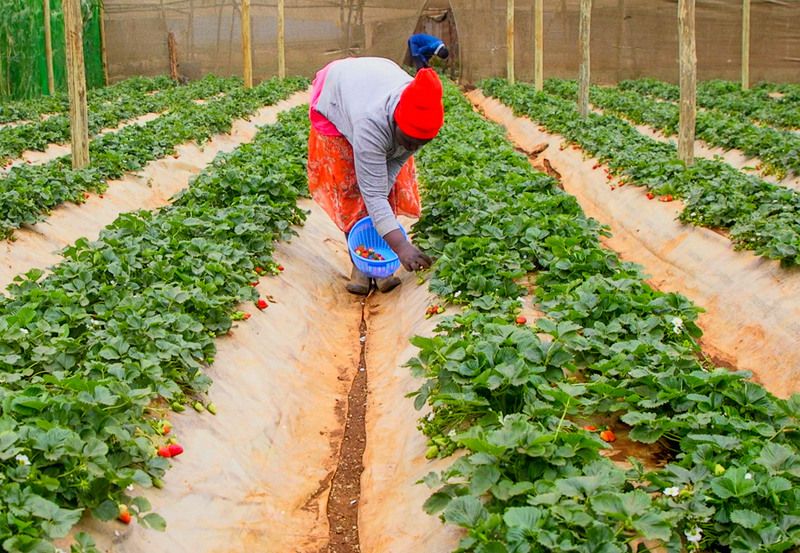By Thuku Kariuki
When Jackline Kwaga left Uganda three years ago to look for greener pastures in Kenya, she initially took up work on a strawberry farm. She worked hard… hard enough to learn the ropes and diversify into her own farming operation, where she now grows maize and strawberries and raises chickens. However, the big breakthrough, as she sees it, was the arrival of irrigation.
“I was using a watering can to water the plants, before. I started using water cans with three nursery beds, and it was helpful. I continued increasing the nursery beds until IrriHub came and installed drip irrigation,” Kwaga related.
The farm services company set Kwaga up with a drip irrigation scheme, ensuring water is distributed efficiently. Water is collected during the rainy season to ensure crops can be irrigated year-round.
Irrihub is a young company specialising in irrigation tailored to fruit and vegetable farming in East Africa. Its products help smallholder farmers increase yields beyond subsistence farming to help farmers sell their produce at local markets.
“Strawberry farming has helped me a lot because I have been able to educate my children and cater for their basic needs,” said Kwaga, who has gone from harvesting 20 plants a week before irrigation was installed to 200 since.
The system does not come cheap. But with providers like Irrihub helping farmers substantially increase their yields, they are able to pay off their investment.
“The assumption is, after two years the client will have like recouped his investment, plus at least 5% on top of it,” explained Samuel Misiko, lead technician at Irrihub.
“When we are doing the overall cost for their system, we do take care of the crop to be grown and then the size of the farm and then the financial level of the client. So that our quote factors all three into our system. We don’t overcharge our clients, and then we don’t underquote them,” he added.
Providers servicing smallholder farmers have an interest in ensuring their customers do well. So Misiko not only educates his clients on how to use and take care of the system, he goes a step further.
“We also do what you call ‘academic services’. We advise the clients on the best crops to grow, the best practices to do when they have grown, and then also try to enlighten our clients on the best market opportunities for their product. So, we don’t just install and leave clients. We help them maintain their soil fertility levels, and also help them find markets for their product,” he said.
Evelyn Waithira Njuguna, who works in communications and marketing for Irrihub, stressed that Irrihub is an innovations company, and offers much more than just irrigation solutions.
“Another benefit that our solutions have given to farmers is that they can be able to grow and sell their perishable crops or produce to the market by using our products such as the solar dryers which removes moisture from the crop. So, for example a farmer that is in an arid region such as Marsabit, they can be able to bring their crops to, for example, an area like Nairobi, and sell when their products are still fresh,” she explained.
“They can also be able to do exportations. Another benefit of our products are the solar pumps which have helped farmers to save on the cost of electricity, since it uses solar (energy) to be able to pump the water,” the communications specialist said.
Njuguna has seen the company grow substantially over the last four years. It is now servicing over 1500 farmers in Kenya and has extended operations to Tanzania and Uganda.
Nor is the Kenyan government sitting on its hands when it comes to supporting emerging farmers. A recent drought, together with Russia’s invasion of Ukraine – which impacted grain imports – had the government worried enough that it has taken action.
In an effort to promote climate-smart farming, it created a department within Kenya’s Agriculture Ministry that focuses on mitigating and adapting to the effects of global warming.
Veronica Ndetu, who leads the unit, said it has two main goals.
“Agriculture that achieves two pillars: increased productivity, increased resilience against climate change, and also does not cause greenhouse gas emissions that are responsible for climate changes” she explained.
The ministry has identified a number of opportunities to support farmers, including supporting research, seeking out sources of funding and providing advice.
“You may find that a certain crop type is needed by the farmer, to change from what they have been doing, and they want to adopt a certain type of crop. You may not find clean, certified seeds for those crops. So sometimes farmers have to struggle. So, the answer here is twofold. Some practices are easy, because maybe it’s just a matter of changing operations within your farm, maybe changing from one type of crop to another. After all, it’s what is adaptable in the area. But then when it comes to certain practices and technologies, then you have to access them from outside,” Ndetu explained.
Kenya’s signature “Silicon Savannah”, which describes the dynamic startup ecosystem in the country, has seen the country blessed with innovators like those behind Irrihub. But there is widespread recognition that farmers need access to financial services and capital to best take advantage of these new opportunities. The government is now working to get more financiers involved in agriculture.
“I see a bright future because there are many players that have come on board to support agriculture in terms of climate-smart agriculture. And these include not just the government but also, they are CSOs, there is the private sector. Because mainly what farmers require are finances,” Ndetu said.
“And I see that if we actually coordinate the kind of support we give to the farmers, we have a bright future for agriculture, and we are going to deliver what needs to be delivered by agriculture, even with the impacts of climate change.”
With around 7.5 million smallholder farmers in Kenya, providers like Irrihub have only begun to scratch the surface of the potential market. It’s a market that is too large to service alone.
“Our future projects entail partnering, increasing our network by partnering with the government, the NGOs that support farmers, especially the smallholder farmers, so that they can be able to access the climate-smart irrigation solutions, even those ones that are in very arid and semi-arid regions,” Njuguna said.
For Kwaga on her farm in Muguga, Kiambu County. The impact of access to irrigation is obvious in her daily life. She now gathers fruit from her strawberry bushes on Mondays and Fridays. That means more sweet treats for her family but, more importantly, a steadily growing income.
For her, the combination of private sector technology initiatives, government support and farmers willing to try new things is really bearing fruit.
bird story agency
Jackline Kwaga's journey from Uganda to Kenya led her to initially work on a strawberry farm, ultimately branching out into growing maize and raising chickens. A pivotal moment came with the installation of a drip irrigation system by IrriHub, enabling her to increase her strawberry yield significantly. IrriHub, a specialist in irrigation for smallholder farmers in East Africa, assists farmers in growing and marketing their produce, thus elevating them beyond subsistence farming. They also provide solar dryers and pumps to help farmers extend the life of their crops and save on energy costs.
The Kenyan government has also initiated efforts to bolster climate-smart farming amid global warming challenges and recent incidents like droughts and disrupted grain imports due to geopolitical events. A department within the Agriculture Ministry targets increased productivity and resilience, supporting research, and securing funding sources for farmers. This collaborative environment involving private sector technology, government initiatives, and cooperative farmers bodes well for agriculture's future, particularly for Kenya’s numerous smallholder farmers.
IrriHub aims to expand its network through partnerships with the government and NGOs to bring climate-smart solutions to more farmers, especially in arid and semi-arid regions. For farmers like Kwaga, the blend of technology, support, and innovative practices is proving fruitful, translating into better yields and improved livelihoods.






